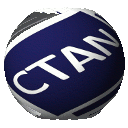Directory macros/latex/contrib/powerdot-tuliplab
Powerdot TULIP Lab Style Package ==================
powerdot-tuliplab is the latex package used in TULIP Lab for presentation drafting. It comes with several sample tex files so that you can quickly start working with it.
If you are creating a presentation using this package, you are recommended to use git to host the repository, and use git-flow to manage the collaborative writing platform for academic presentation authoring.
## I. Required Packages
You should be familiar with LaTeX, if not, you need learn it from WikiBook.
We recommend the following packages for cross platform writing:
## II. Contained Files
This package contains the following files
powerdot-tuliplab.styTULIP-Lab Style Filetuliplab-P00.texA Simple Presentation Sample with Transitionstuliplab-P01.texOne Academic Presentation Sample with References Listtuliplab-P03.texOne Sample file with PSTrick figures.logos/tulipFolder of images for slides graphics.
You can use replace logos/tulip.eps, logos/tulip-wordmark.eps with your favorite images. Four alternatives are also provided in the folder for top left picture, two banner options provided.
## III. Package Installation
- Copy files the whole folder
powerdot-tuliplabwith filepowerdot-tuliplab.styand folderlogosfolders to your home directory under~/texmf/tex/latex/powerdot-tuliplab; formacOS, please put it under/usr/local/texlive/texmf-local/tex/latex
- Refresh
TexLiveby typing the following command:
cd sudo texhash
For Mktex on Windows, you can run mktexlsr
- For compiling, you should use the chain operators
LaTeX -> DVI, and thenDVI -> PS, finallyPS -> PDF.
## IV. Setup the Repository for Your Own Presentation Slides
Those examples provided in this package can be used as the template, and I recommend you create a new repository in your git platform, initialized with one sample tex file in this package.
- Customize the file name:
- change
tuliplab-P0X.texinto a suitable file name
- change
- Check out the repository to local drive, and set up the local environment for
gitinfo2package:
- Download/copy those files from `https://github.com/tulip-lab/templatex/tree/develop/templatex/gitinfo`, which is the `gitinfo` folder with three executive `bash` `shell` scripts:
* `post-checkout`
* `post-commit`
* `post-merge`
- Copy or move these three files into your repository's `.git/hooks` folder.
- For example, if the root of your local repositories is `~/MyFancySlides`, then you can copy/move above three files to `~/MyFancySlides/.git/hooks/`.
- Test Run: check out or pull your repository, and it should generate/update the file `./git/gitHeadInfo.gin` in your local repository.
- For example: check `~/MyFancySlides/.git/gitHeadInfo.gin`.
- Compile the main `LaTeX` file, and view the `PDF`.
- Happy LaTeXing!
V. Rules for Collaborative LaTeXing
You MUST follow the following rules when writing collaboratively. Otherwise, your co-author will find it impossible to work together.
III.A. LaTeX Source Code
- Avoid ineffective modifications.
- Do not change line breaks without good reason.
- Turn off automatic line wrapping of your LaTeX editor.
- Start each new sentence in a new line.
- Split long sentences into several lines so that each line has at most
80characters.
- For all the marginal comments by other co-authors, you MUST responed to them using a responsive marginal comment, such as
```latex
\gangli{What is wrong here?}
\qwu{This is my response ...}
```
- If your comment has been properly addressed by co-authors, you MUST remove or comment out both the original and the response marginal comments.
- You can use the following code to indicate where you are updating up to:
```latex \HRule %TODO: YourName up to here! ```
III. B. Repository
- Put only those files that are directly modified by the user under version control.
- Verify that your code can be compiled flawlessly before - committing your modifications to the repository.
- Use
git-latexdifforlatediff(orgitcompare tools) to critically review your modifications before committing them to the repository.
- Add a meaningful and descriptive comment when committing your modifications to the repository.
- Use the
gitclient for copying, moving, or renaming files and folders that are under revision control.
- Use
git-flowscheme to createfeature,branch,releaseandversionof your paper. Be really careful when you are touchingdevelopormasterbranch.
Download the contents of this package in one zip archive (1.6M).
powerdot-tuliplab – A style package for Powerdot to provide the design of TULIP Lab
powerdot-tuliplab is the LaTeX package used in TULIP Lab for presentation drafting. It comes with several sample .tex files so that you can quickly start working with it.
| Package | powerdot-tuliplab |
| Home page | https://github.com/tulip-lab/templatex |
| Support | https://github.com/tulip-lab/templatex/issues |
| Bug tracker | https://github.com/tulip-lab/templatex/issues |
| Announcements | https://github.com/tulip-lab/templatex |
| Repository | https://github.com/tulip-lab/templatex |
| Developers | https://github.com/tulip-lab/templatex |
| Version | 1.0.0 |
| Licenses | The LaTeX Project Public License 1.3 |
| Copyright | 2012–2018 Gang Li |
| Maintainer | Gang Li |
| Contained in | TeX Live as powerdot-tuliplab MiKTeX as powerdot-tuliplab |
| Topics | Logo |
